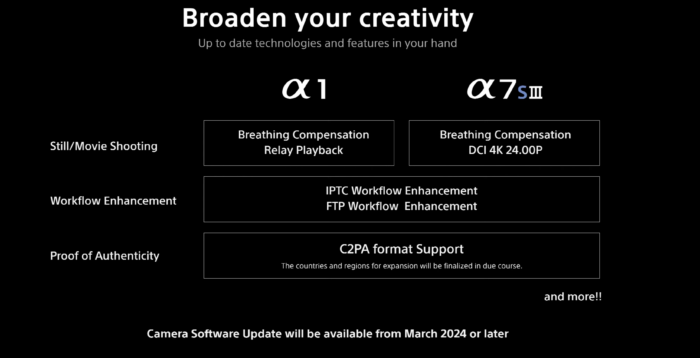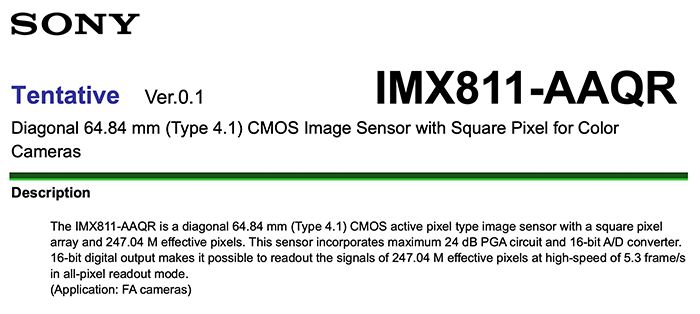(SR4) Hot news! Sony revolutionizes the sensor world? Makes world’s first Active Pixel Color Sampling sensor (APCS).

Important Note: I got this image from Cnbeta. But I already saw patents of that tech before and that’s why I rate the rumors with SR4!
Sony kills the long Bayer Sensor story:
If what you see here on top will become true than this will change the photography industry! Say goodbye to the classic RGB Bayer sensors because Sony is going to announce a new “Active-Pixel Color Sampling sensor (APCS)” in 2015! The specs sheet above shows the new 1.5 inch sensor with 4,8 million pixels. And I guess some of you would think that’s way to low but here comes the big news:
Every single pixel can take the full color info with the help of an electrified moving color filter!
How this works in detail is yet not described on that paper. But basically instead of having four pixels “RGBG” interpolated into one single pixel information (as it happens on usual Bayer sensors) every pixel on the APCS sensor grabs the full color information. On paper there is no need of interpolation (we still don’t know exactly how this works). But please keep in mind that in real world the difference may be much smaller (current RGB sensors indeed also uses all sort of interpolations to increase resolution).
This is a more advanced solution than Sigmas Foveon sensor used on DP cameras. Sigma uses three vertically ordered R-G-B layers. But also here you need to merge three pixel information into one and you also struggle with noise level because electrons get absorbed (or lost) on each layer.
Positive effects of such a sensor design are:
– Bigger pixels compared to same resolution Bayer sensor. This means more electrons captured and therefore higher dynamic range and lower noise (crazy ISO possible…even crazier than those of the Sony A7s).
– No moire issues anymore. No Anti Aliasing filter needed (increases per pixel sharpness).
– That tech also allows to make crazy high megapixel sensor. For example if you keep an Sony’s APCS pixel size same as the current Sony A7r 36MP RGB pixel size sensor you could in theory make a much higher resolution sensor with same noise level.
– Less pixels to read means also faster processing and readout.
– You actually can have a “full-monochrome” sensor :)
Other key features of the new APCS sensor:
– Electronic Global shutter. No more “jello” effect on videos!
– Records 2K with 16,000 frames per second (processor doesn’t have to be interpolate between RGBG pixels and therefore can use full power to read out more frames per second!). Note that the current Arri Phantom Flex shoots 4K at 1,000 frames per second.
When are we going to see that sensor?
I believe that sensor will make it into a Z4 phone first. “Classic” Alpha photocameras will get the same sensor tech on APS-C and FF sensors later!
What I know beside that spec sheet:
Trusted sources told me “complete new” sensor tech would be introduced on the verge between end 2015 and early 2016. I also saw plenty of sensors describing such kind of pixels with electronic color filter. I will now try to collect some of them to show them to you in a future post. So while I posted this rumor with an SR4 ranking only (see ranking description below) I have a strong feeling this rumor is true. I will wait for my trusted sources to upgrade this to SR5 as soon as I can!
To not miss any of the (I promise you) damn exciting rumors follow SAR here:
RSS feed: http://www.sonyalpharumors.com/feed/
Facebook: https://www.facebook.com/sonyalpharumors
Twitter: https://twitter.com/SonyAlphaRumors
GooglePlus: https://plus.google.com/104216500156717934391/posts
And if you have some “rumor” to share just send me an anonymous messages here:
Error: Contact form not found.
Reminder (SR = Sonyrumor):
SR1=probably fake rumor
SR2=rumor from unknown sources
SR3=50% chance it is correct
SR4=rumor from known sources
SR5=almost certainly correct!
Hot: The full Black Friday deals can be seen on at that Amazon US page (Click here to see the long list).


